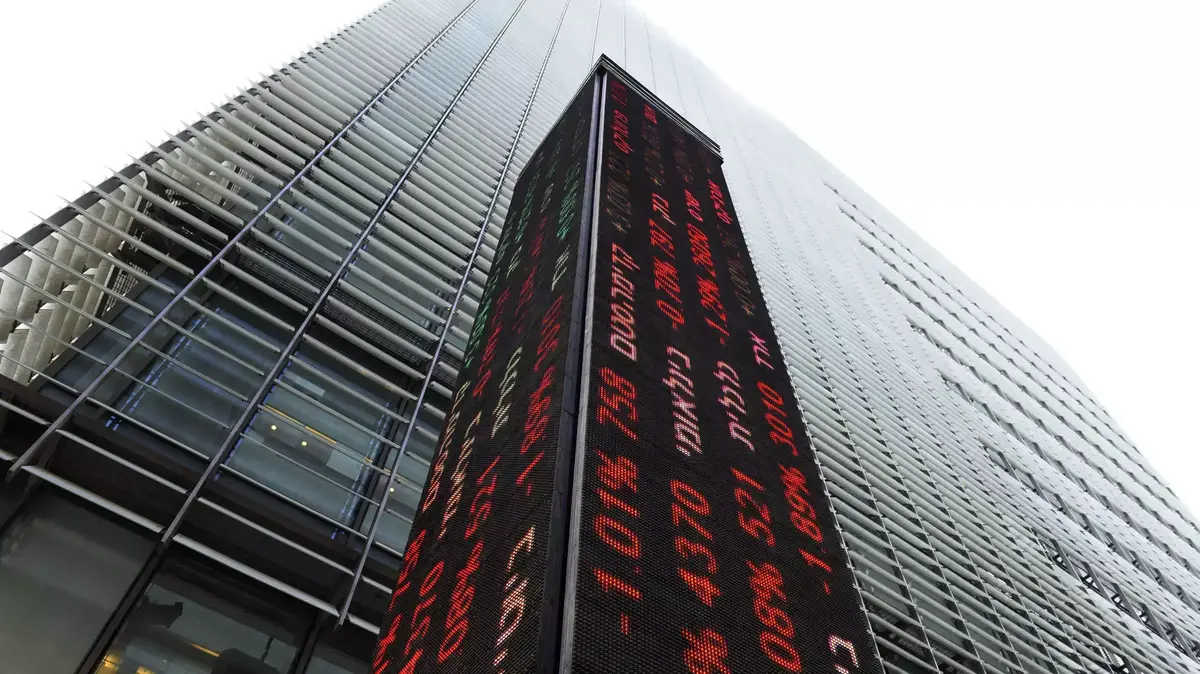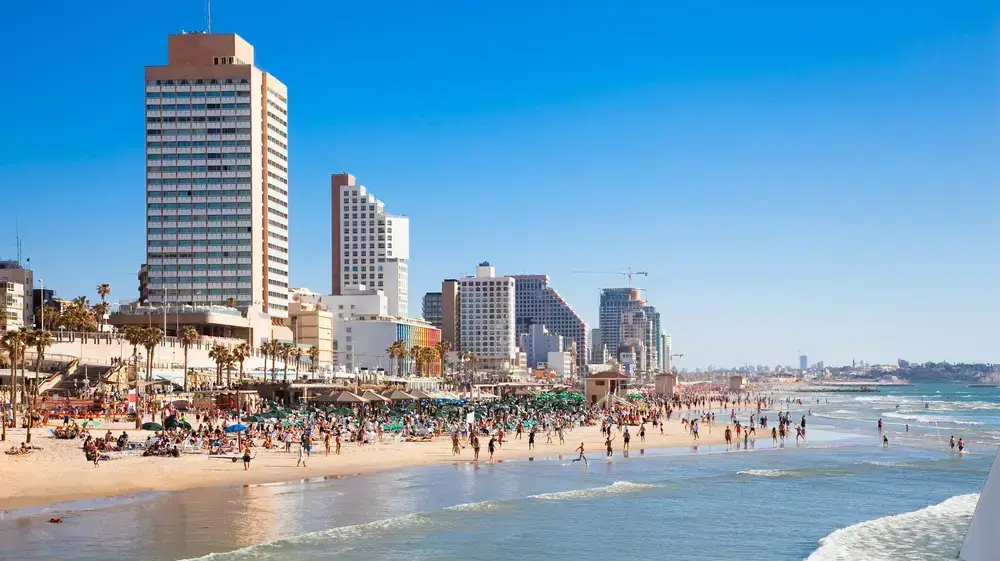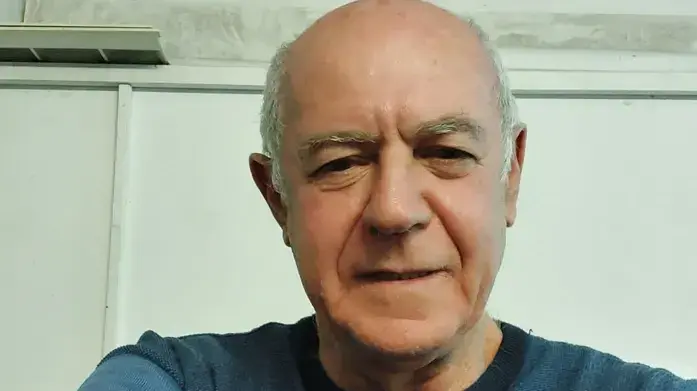From Kfar Bara to Kfar Shmaryahu: The man behind the only Arab company on the Tel Aviv Stock Exchange
At 42, Ryan Moand became the owner of a foreign banking credit company that recently issued bonds on the Tel Aviv Stock Exchange. He now talks about the unrealized potential of business owners and consumers in the sector, and the way he did from Kfar Bara to Kfar Shmaryahu
Before Ryan Moand, the owner of Melran Projects, moved to Kfar Shmaryahu, he used to go every morning to drive his children from his previous home in Kfar Bara, in the Triangle to the Jaffa Orthodox School. Yes, Moand is not a long-time recoil, and as far as his children's education was concerned, it was not a barrier for him, nor in his business did he give up until he broke the glass ceiling. Last month, Malran entered into projects in the Arab sector for non-bank credit, on the Tel Aviv Stock Exchange, becoming the only public sector company in the Arab sector currently traded there, and the second ever to do so (preceded by a bullous Gad that was public in the previous decade, but collapsed).
Melran has now become public by issuing debt (bonds) to the public, but as revealed in "Globes", the company plans to issue shares in the near future as well - a plan that must have taken a back seat to the success of the bond issue: Melran sought to raise 70 NIS million (at a rate of 3.9%), and in light of the high demand, finally raised NIS 120 million - the maximum threshold it set.
Of course, the success of the IPO is due in part to the fact that the non-bank credit field currently stars as one of the hot spots on the Tel Aviv Stock Exchange, but the rest of the credit should probably be given to Moand and his character. "From day one, I thought about someday going into the stock exchange," he tells G in his first media interview. "As a member of the sector that knows how to respond to its field, to lead it and be the biggest, it's a dream I kept thinking and aiming for - to connect the need for small business with the capital market."
Did you bother that everything that was written about the company in the story's press was focused on being an Arab?
"No, why? I take pride in the fact that there is success here, no matter how it was presented. As long as that effect advances the company I come from and the interests of the company, the rest is less important to me. What matters to me is that it will yield business-level fruit and look at it. The company as a company that knows how to initiate, make moves. This is what will give incentives for other businesses in the sector to enter the stock exchange. "
From what you know, are there a lot of businesses in Arab society that are considering entering the stock exchange and sitting on the fence in the meantime?
"There are, maybe even dozens. And they should be helped. The purpose of my move - beyond the business aspect - is to set an example for the business people who are on the verge of deciding whether to make their company public."
"The sector has not been addressed"
Looking back on the course of Moand's life, it is not surprising that at the age of 42 he is already in control of a stock exchange. He was born in the village of Barra to an 11-person family engaged in agriculture ("Every morning I went to work at five-thirty, I ran around the orchards and tractors"), and when he was 19 he went to study mathematics at the Hebrew University of Jerusalem. When he decided that the field was not practical and Jerusalem was not suitable for him, he moved to computer science at Netanya College, and at the same time began working in the computer field, as a computer installer in homes.
The business grew until, in 1998, he became a distributor of several leading technology brands such as Lenovo, Toshiba, Intel and Microsoft. He said that five years later the company's sales turnover was $ 1.3 million.
In the background, too, the matter of principle stood. At a major event that he did at the time as a major distributor in computing, he stated that he had decided to edit it to show that "it is not worthwhile and undesirable to ignore Arab society", which is a significant purchasing power. The computer market in the Jewish sector is saturated, he explained, and it is difficult to sell new merchandise, while the parallel market in the Arab sector is virgin, and the volume of trade there is increasing year by year. This business activity brought him great exposure to businessmen in the Arab sector and close acquaintance with the business sector in it, and helped him to gain a better understanding of the way businesses operate in the Arab company.
In late 2008, when the global crisis was at its peak, the computer sector was significantly cut, and Moand was exposed to the credit shortage for business in the sector. It was also the timing when he set up Maleran, with the goal of meeting the need for business there on credit.
Even today, Malaran, which is only leading about 15% of its credit portfolio - which is NIS 300 million - comes from businesses in the Jewish sector. The main activity of the company is concentrated on discounted checks ("deferred relays") - a conversion transaction in which the company's customers receive the financial value of the rejected checks, which are transferred to the company in exchange for a percentage fee.
"In Arab society," he explains, "the scope of action is large. It is possible to reach a lot of businesses and do much more significant work than the Jewish sector, where ten companies (public, see below) already work, and the market is already saturated."
An Arab company that needs credit encounters difficulties or problems that are different from those of a parallel company in the Jewish sector?
"The problem is with regard to the banking system to the Arab population and to Arab society. There was an" Arab bank "that merged into Leumi, and was" Mercantile, "and these are the only two banks that had branches in the Arab sector. They did not know how to meet their needs, or whether the banking system could not provide them with what was needed. "
Tell you that the banks don't really know how to respond to small businesses in the Jewish sector.
"Arab society has not been addressed - not then, and not now. But it is also a population whose culture is different. Take, for example, the support of the family. In Arab society, family members tend to help (financially), in 80% of the father's families bringing the son home, and The business, and supports it throughout, is a support whose essence is different from that of the Jewish sector. "
What else is different?
"In the end, also approaching the banking system is a matter of knowledge and understanding and you need to know how to do it. This is another failure that characterizes the sector. Until two years ago, the bank's branches did not address the needs of this sector and there was no neat market for non-banking credit. The latter is getting better and better. "
And where do you fit into this reality picture?
"As a person from the Arab company, I know the needs and mentality so much, I live and breathe business operations in the sector, so when I entered the credit field I knew exactly what the points were and what I needed, and I started to build the way and translate it. If it's in a business system that can respond, And if it's in the direction of building a relationship with funding agencies. "
Until you arrived, what did businesses in the Arab company that did not receive a response from the bank do?
"Worked against all kinds of pirated check agents. The Arab sector is alive from tomorrow, it has not grown accustomed to the state where the bank knows how to finance working capital. Businessmen in the sector get paid and turn it into cash, and so pay suppliers and finishers. "Their commercial properties, not everyone knew how to plan. In the meantime, the market was getting better and they couldn't catch up with that gap."
And how is your added value reflected?
"We see ourselves as a significant factor who knows the needs of the business and offers solutions. We do not sit around waiting for a check to come to us, we know the mentality, know the needs and identify ourselves with the businesses we have located and try to show them what is good."
One of the significant benefits that Moand speaks of is the personal acquaintance he or she can develop with business owners in the sector; While other companies that are debating whether to give credit to a small business should rely on the various information companies that provide this service or on industry-standard procedures that include "know the customer" questionnaires (KYC).
"I don't want to go into any of our operations, but I know the people behind the business," he said. "It's not that random people I don't know about. It gives me tools to look at the business and the check it receives from the customer. Unlike other companies, we not only rely on documents but do a little transition, checking customer information in all the ways we have , Ask other businesses who work with them.
"We have familiarity everywhere in Arab society, and at the end of all these activities converge to some point that gives us a lot of in-depth information about the conduct of the business. Other companies do not go into the depth of environmental recognition, they do not have the tools."
So can you do business in front of a wider population and give credit to customers who might have been disqualified by the banks?
"Before I get to the position that I'm disqualifying someone, I need to know why I'm disqualifying him. When a bank disqualifies, he doesn't always know why. The same thing about approval: If I approve of someone, I need to know why I approve of it. In the end, credit is information, understanding , Familiarity, so we always try to reach out and hear from business owners and give solutions or at least give our opinion. "
"We realized the IPO could come quickly"
This Moand approach seems to be working. Melran ended 2018 with revenues of approximately NIS 45 million and a net profit of NIS 12.5 million. Melran concluded the first half of 2019 with a 24% improvement in its financing income of NIS 25 million, and net income reached more than NIS 5 million (the improvement in net profit was only 4%, due to a sharp increase in administrative, general and other expenses ).
Last December, Melran received a BBB rating from S&P Maalot, which defined her as "one of the medium-sized non-bank credit players". The rating reflects Maalot's assessment that "Malaran's competitive position in the industry is limited, due to its size and its relatively narrow business focus in the credit sector - businesses in the Arab sector."
The report also analyzes the unique characteristics of the Arab sector, where "most of the population lives in low socio-economic clusters communities ... and the access to banking sources of finance is limited, which probably also leads to low leverage." "We believe," writes further, "that (credit) risk in the Arab sector may be higher than the general population, although Malran's credit losses in recent years are not significantly different from the other companies in the industry, due to its strict customer selection."
This corre- sponding sentence in the Maalot report is reflected in one of the impressive financial figures presented by Malran, which indicates only 0.05% of lost debt. That is, the company hardly gives credit that it fails to charge back.
How do you get to that figure?
"In Arab society when there is a problem everyone is recruiting. The father does not want to see his son in debt, and there will be no situation that he will not give him his back. We also have an excellent relationship with the customers, so they do not want to escape and deny the debt."
This element of financial aid within the family is also the one that has kept the sector out of the financial sector to this day. "The mentality in Arab society is not to take money from the banks, but from family and friends," says Hagit Rubinstein, VP of the Koret Foundation, which provides loans to small businesses and operates in the Arab sector as well. "It created some thought that the banks were not willing to give them money. But today there is competition in the sector, and the two banks that operate it have opened more and more branches in Arab localities. "
Another element that plays in Maleran's favor is its mode of operation, which is based on the fact that the company's customers do not usually come knocking on the doors of its offices, but rather it is the one who locates them and reaches them. "We have an internal database that we are constantly analyzing," says Moand. "With this information, we turn to customers. It reduces the percentage of rejections (rejected referrals). On the other hand, when you contact the customer, it can sometimes take two months to recruit."
The next stage of its evolution from Laren has to the phenomenon of recent years that has transformed the field of non-bank credit to the stock exchange's favorite. The first company was the Nawi Brothers, which went public in 2012, and since then more and more companies have been added to the Tel Aviv Stock Exchange, with Maleren being the 11th in number. Moand says the plans to issue have been around for a while, but "when the market opened, it led us to realize that it would happen much faster than we thought."
The local stock exchange, which has struggled in recent years to get companies to reach it, is naturally pleased with Melran's move and hopes to see it as the first swallow. "The Arab company constitutes 02% of the population in Israel and has excellent business with great potential to match the IPO," says TASE CEO Itai Ben Ze'ev. He said active efforts are also being made to make other companies from the sector public. The fear barrier with their bond raising, "Ben Ze'ev adds," and hopefully they will also issue shares later. "
A few months ago, Melran hired David Granot, former CEO of the International Bank, as a consultant to the company, to make it public. Shortly thereafter, Moand, through a mutual friend, met Ronnie Sternbach, the controlling shareholder of Ildav Public, and last August stepped in. After buying 25% of its shares for NIS 21 million (that is, at a company value of NIS 84 million), Ildav took over a share conversion loan, and Ildav also gave the company a NIS 17 million loan.
"The goal of Eiladev's entry," Moand said, "was to strengthen the company's capital so that we could go public and enter into the stock exchange, and also gain exposure to the capital market. Beyond Equity Investment, Eiladav was able to embark on this move quickly. I also found a good partner that I could consult with and learn from his experience. "
And what does Groom Sternbach say? "This company is organized at a level that no company is built on: there are well-organized departments, there is an emphasis on the legal field and marketing strategy. And that everyone in the field does not sit in the office and receive checks - the credit market is a key factor."
What led you to invest in it? Are you building on Exit in the future?
"Our investments are not characterized by exits. We see every investment as a long journey, and the first test is the personal aspect. The connection with Moand was outstanding, and it was certainly the deciding factor. Obviously, this (off-bank credit) market is also excellent, the regulator pushes , And the growth possibilities are endless. "
The latest development in the business so far concerns another large body that has joined the investment in Moand's company. This time, it is the working underwriting company IBI, which announced in September an investment in Maleran through the acquisition of some of Eiladav's rights and obligations, totaling NIS 9.1 million.
And that didn't come to the news, as the company revealed this week at Globes that Melran received a NIS 053 million credit facility from American investment bank Goldman Sachs. The company has already reported to the stock exchange the receipt of such a loan from a "foreign body" (this is a non-recourse loan), but now in a lawsuit filed against it by Yaron Bernholtz, who he claims initiated and liaised with the bank, Goldman Sachs' name was also revealed.
"I don't deal with politics"
The Malran offices are in a location that is not the first thing you would think of for a company operating in the Arab sector: Ramat Hahayal in Tel Aviv. When I ask Moand if this is a statement, he explains that the location is chosen to protect customers' privacy. "Credit is a discreet thing," he says. "It was important to me to keep the discretion of the customers so that they did not feel that they were getting credit and honestly identify them. Imagine that we would place the office in one of the villages so that everyone sees who comes in and who leaves."
He also tries to ward off the question about his non-trivial place of residence, while partner Sternbach, who does not hide his displeasure with the subject, adds that "it is non-Ishio."
Are you comfortable in Kfar Shmaryahu? You are probably the only Arab family there.
"It's very convenient for me. It affected the children for the better, promoted them and gave them a good standard of living, so why is it strange? Why should you see a choice that brings you to a high standard of living as strange? My neighbor dies on me and neighbors come and mingle. Starting my own business is my way of life. The workers in the company were from both the Jewish and Arab sectors. I came from a family where my father worked with the Jewish Agency. "
Most of your friends today are Jews? Evenings?
"I am a person who has social ties with everyone who is successful, who is a person first and foremost, no matter if he is Jewish or Arab. In the end, we live in a place where everyone should be friends of everyone."
It is tempting to indulge in this reality, but outside of the beautiful offices of Maleran, the world continues to operate as usual. On the way to an interview with Moand, for example, the statements of MKs could be heard on white, stating that they would not cooperate after the elections with the joint list.
Moand remains in his mind: "I don't deal with politics, it's for the politicians. I look at my daily life, my small family, and the life around me. In the end, my goal is to succeed and bring about things that can also do well for the Arab sector. Such can be fought and done much more than through talk of politics. "
Yet?
"We can't solve the problems. So, like I said, I look at the people I live with and the businesses I work with. I see that we all know how to get along, and I hope this trend continues and solves the problems that politicians deal with."









